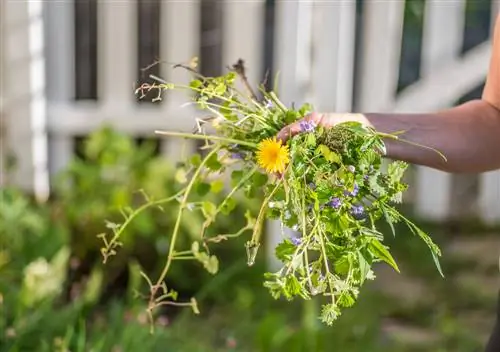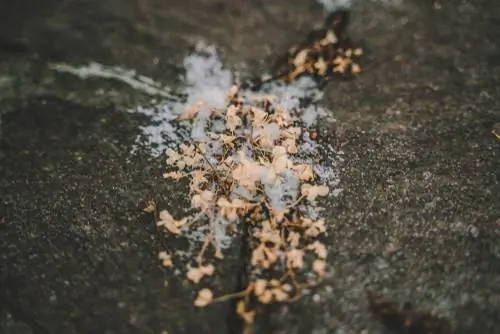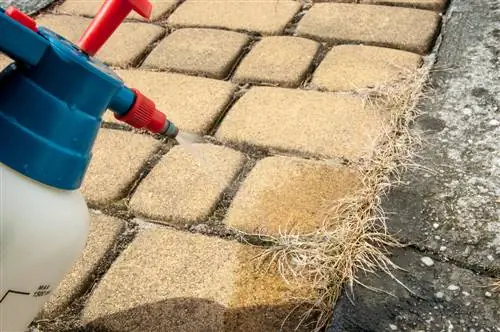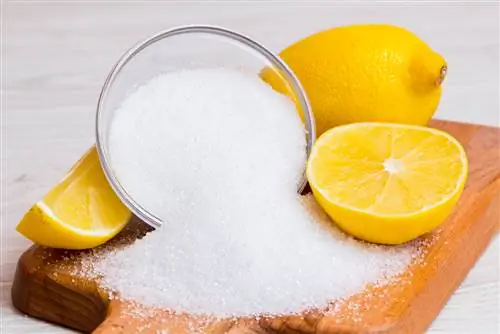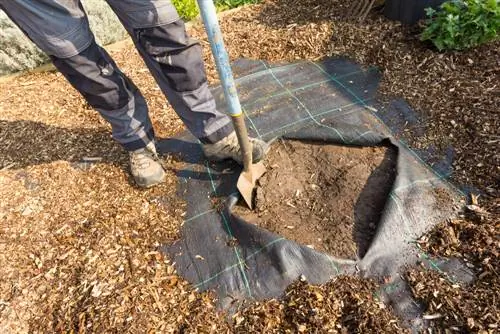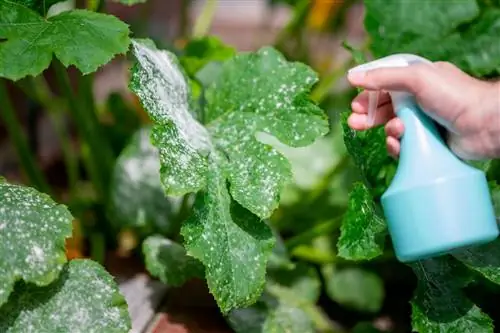- Author admin leonars@hobbygardeners.com.
- Public 2023-12-16 16:46.
- Last modified 2025-06-01 06:02.
Vinegar and s alt are well-known home remedies that can be used to effectively remove weeds from the garden, but also from sidewalks and other areas. Even if everyone uses these resources in the household, their use is not without problems.
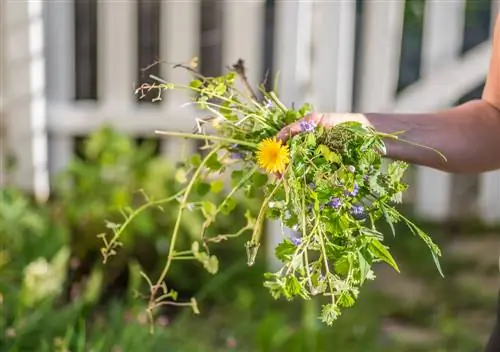
Can you use vinegar against weeds?
Vinegar can harm weeds due to its acidity, but is problematic for the environment and neighboring plants. It should only be used in low concentrations and in limited quantities. Alternatively, more environmentally friendly methods such as weeding, mulching or burning are available.
“A weed is nothing more than an unloved flower.” (Ella Wheeler Wilcox, American writer)
Vinegar - a natural weed killer?
Almost everyone probably has a bottle of apple cider vinegar or vinegar essence at home, after all, the acid is very versatile in both the kitchen and the household. You can not only season dishes with it, but also remove limescale deposits from the kettle and bathroom and can even use it to clean - which in turn makes expensive chemical cleaners completely unnecessary.
The old home remedy is also said to do a good job in removing weeds in the yard and garden and also protect the environment. But is that really true? Does vinegar actually help against weeds? In this article we will explain to you whether and what is true about this tip - and why it is better not to use vinegar on your beds.
How it works
For plants to grow he althily, the acid-base value - the so-called pH value - must be in balance. Because vinegar is an acid, it acidifies the soil and damages plant cell membranes. That's why the household helper in the garden is not entirely harmless, as long as you use it undiluted and in high concentration.
A small splash of vinegar in a jug of irrigation water, on the other hand, only lowers the pH value slightly and has no negative effects on weeds and other plants. However, in this way you can soften hard water and neutralize limescale - which is not always desirable in irrigation water. Vinegar is actually advisable for this purpose, but less so as a weed killer.
If highly concentrated vinegar gets into the soil, it not only burns the roots of the weeds. Neighboring crops are also affected, so that both can no longer absorb water and subsequently dry out. In addition, the soil becomes acidic when vinegar is used, which is why you have to counteract the drop in pH with regular doses of lime. All of these side effects prohibit the use of the product, for example in vegetable patches or flower beds - you would then have to dispose of both together with the weeds.
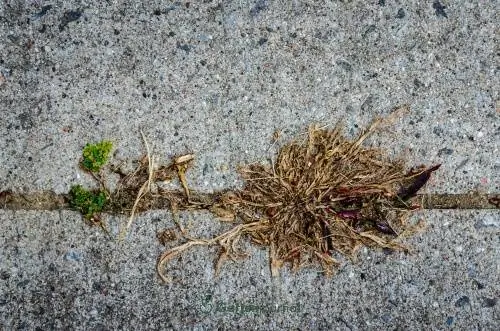
Vinegar harms weeds and everything else that lives in the soil
Vinegar has these benefits against weeds
Many hobby gardeners prefer old home remedies such as vinegar and s alt because they are supposedly more environmentally friendly than chemical weed killers. In addition, various vinegar-based brands are available in stores for a lot of money, which is why vinegar essence seems to be a good alternative for cost reasons alone - after all, the effect of the commercial products is the same. So vinegar appears at first glance as:
- effective against weeds
- cost-effective
- easy to use
- safe for children and animals
The disadvantages speak against using it
No question, the benefits of vinegar are convincing. However, the acid also has a number of disadvantages that speak against its use. The most important counter-argument is the acid, because it gets through the soil into the groundwater and destroys the balance between acids and bases everywhere. In order to use vinegar effectively against weeds, you would have to apply larger quantities - and these always have a negative impact on the environment. Other disadvantages are:
- Effect does not last long
- Weeds are often only attacked superficially, but not at the root
- that's why they keep pushing out
- therefore the application must also be repeated
- Damage not only to weeds
- Neighboring (crop) plants are also affected and die
Tip
The effects and disadvantages described here also apply to certified vinegar-based weed killers from specialist retailers. Although it is often advised to use these instead of household vinegar, after all they are tested and therefore safe, but that is just window dressing.
Is vinegar allowed as a weed killer in the garden?
Especially since the use of vinegar in the garden - especially in combination with s alt - is a delicate matter for legal reasons.
For a long time, vinegar and vinegar essence were considered plant protection products if they were used against weeds and other plants. For this reason, their use on paved and otherwise sealed surfaces was prohibited. Since the Oldenburg Higher Regional Court overturned this classification in a ruling in 2017, vinegar is no longer considered a herbicide - i.e. a plant protection product, but may still not be used indefinitely in private areas.
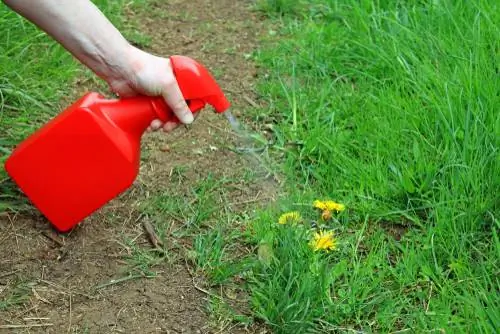
Vinegar is an environmentally harmful pesticide
Both the chambers of agriculture and the environmental protection offices are sticking to a ban on the use of vinegar to destroy weeds, especially on non-cultivated areas (terraces, garage driveways, parking lots, etc.) and justify this as a violation of Section 3 of the Plant Protection Act - a "Violation of good professional practice”. If punished, this can result in a fine of up to EUR 175.
This is not an illogical chicanery, but has solid reasons: Vinegar is only biodegradable in small quantities and quickly ends up in the groundwater. However, this is not desired by the sewage treatment plants, as vinegar residue cannot be filtered out and also permanently changes the pH value of the water.
Application
In view of the current legal situation, vinegar should never be used on paved or otherwise sealed surfaces. The product has no place in the vegetable patch either, after all you want to eat your harvest afterwards. In general, before each use, check whether there is a better remedy without undesirable side effects - you will find a few of them clearly presented in the table further down in the text. However, if there is no alternative to vinegar, use the old home remedy as described in this chapter.
Vinegar or vinegar essence?
In the supermarket you can get different types of vinegar, each with a different concentration. Conventional vinegar, for example, contains up to six percent acetic acid, while vinegar essence is significantly more concentrated with a content of up to 25 percent. This concentrated acetic acid can cause chemical burns if handled improperly - not just on plants, but also on your skin. Therefore, if you use it, you should definitely observe the following safety instructions:
- Wear closed eye protection, especially when spraying
- Use protective gloves made of nitrile or another resistant material
- never use indoors, always ensure good ventilation
- never inhale the spray mist, otherwise chemical burns on the respiratory organs could result
- do not spray in windy weather
- In the event of contact, immediately rinse the affected area of the body thoroughly with water
- If necessary, consult a doctor (e.g. if vinegar essence gets into your eyes)
Apple cider vinegar, which can also be used to remove weeds in the garden, is considerably milder. However, that does not mean that this type of vinegar is less harmful to the environment.
Mixing ratio
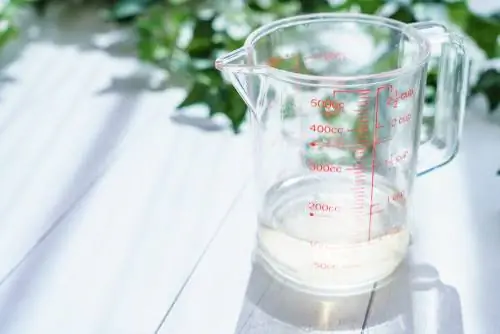
Vinegar should never be used undiluted
You should not use vinegar more than twice a year and only in a concentration of 100 milliliters of vinegar in one to two liters of water. This amount is also the maximum amount that may be applied per square meter of area. By the way, the weed killer you mix yourself works better if you boil it before using it and pour it hot over the weeds. In this way you combine the effects of acetic acid with the thermal ones. Also add a few squirts of dishwashing liquid to the mixture so that the vinegar mixture doesn't simply run off the leaves.
Best time
It is best to apply the vinegar in sunny and dry weather, as rain would simply wash the product off the leaves again. In addition, the sun intensifies and accelerates the effect on the weeds to be eliminated. You can see this very clearly in a direct comparison between weeds growing in sunny and shady locations: With shade plants it always takes a few days longer until the leaves turn yellow and finally dry up.
By the way, you can save vinegar by cutting off the above-ground parts of larger plants and simply watering the remains with the solution. In this way you need much less of the product and therefore protect the environment.
Instructions for applying vinegar against weeds
The following tips are also helpful when using the vinegar:
- spray only from a short distance
- It is best to apply specifically with a brush
- use only in spring and summer
- only treat young plants before sowing
- Additionally remove seeds by hand
- always use as small amounts as possible
- never spray in windy weather
Excursus
Vinegar against weeds in the lawn
Vinegar is a terrible choice for removing weeds from your lawn. You should only treat the unwanted plants themselves - ideally with a brush - and under no circumstances the grasses directly next to them. But since this is almost impossible - after all, some of the acetic acid always ends up in the soil and the grass absorbs it - your lawn will wilt and dry out as a result.
Why you should avoid vinegar and s alt
The combination of vinegar and s alt is touted by some hobby gardeners as an insider tip against weeds - but be careful! If the use of vinegar is a legal gray area, the use of s alt in the garden is strictly prohibited and can result in high fines of up to 50.000 EUR will be charged. The reason for this is as simple as it is obvious: s alt not only changes the pH value of the soil, but also massively endangers the groundwater. In addition, nothing grows on s alty soil - and your garden gradually mutates into a desert. Therefore our advice: stay away from the s alt!
Alternatives to vinegar
No matter how you twist it: The best and most environmentally friendly method against weeds is and remains good old weeding or digging. Of course, such work is unpopular, time-consuming and tedious, but there is no alternative. The following video with tips on how to control weeds without chemicals clearly shows how much work it is to mechanically remove weeds from the garden:

The following table provides an overview of other effective but environmentally friendly alternatives to a homemade weed killer made from vinegar and s alt:
| Method | Material / Tools | Implementation | Pro | Contra |
|---|---|---|---|---|
| Flame | Flaming device (mostly based on Bhutan (€67.00 on Amazon)) | flame the area in question with the flame device | reliable killing of weeds, clean areas, fast | only for asph alted or paved surfaces, fire hazard, weeds keep coming back |
| Baking powder (baking soda) | baking soda or baking powder containing soda | mix a solution containing soda and spray weeds | similar to vinegar | similar to vinegar |
| Stinging nettle manure | Allow nettles to ferment in water | Spray weeds with undiluted manure | well effective, natural and without any unwanted side effects | also damages nearby crops |
| Rock flour | Rock powder, e.g. B. Quartz sand | Apply stone dust to the areas that need to be kept weed-free (e.g. joints of paving stones) | reliably keeps weeds away | needs to be renewed regularly |
| Weeding / Shoveling | Hoe, Schuffel | Chopping off and scooping weeds | ecological, without side effects, loosens the soil at the same time | very labor intensive |
| Boiling water | hot water | pouring hot water over weeds | kills weeds reliably, without side effects | also kills neighboring crops, weeds keep growing back |
| Mulching | Mulching material such as bark mulch, sawdust etc. | Mulch the area to be kept weed-free | Weeds do not grow, decomposing mulch acts as additional fertilizer for crops | not suitable for all surfaces and plants |
Effectively prevent weeds
Better than laborious work to combat annoying weeds, however, are preventative measures that significantly reduce the infestation pressure and thus give you more time to relax in the garden:
- scarify the lawn in spring and lime if necessary
- Always keep grass short and never let weeds reach seed maturity
- Cover beds with mulch
- alternatively plant ground cover
- lay weed fleece under paving stones and paths
Frequently asked questions
I heard that baking soda also helps against weeds. Is that true?
Our grandmothers used baking powder to tackle stubborn weeds. To do this, mix two to three packets with five liters of water and water the plants to be removed with the mixture. But be careful: Firstly, the trick does not work with all baking powders, but only with baking soda and secondly, this product does not differentiate between weeds and useful plants: they are all simply destroyed, and the pH value is also unfavorably influenced.
My grandma recommended Coke for the weeds in the joints of the paving stones. Does this actually help?
In fact, because of the phosphoric acid it contains, Cola is an effective means of removing moss from paving joints, for example. The disadvantage, however, is that the product is extremely sugary and therefore sticky. So you don't save any work because you
- apply the cola on the area to be treated
- remove the dead moss or weeds
- and clean the sticky surface
have to.
Can I use magnesium sulfate (Epsom s alt) instead of s alt?
Even though it's called Epsom s alt, there's no s alt in it. Magnesium sulfate is not suitable for killing weeds, but on the contrary provides them with valuable nutrients. After all, it is a fertilizer that is primarily used on lawns.
Tip
Instead of a Bhutan burner, you can also use infrared devices to flame the weedy areas. These weed burners are available from well-stocked specialist retailers.

